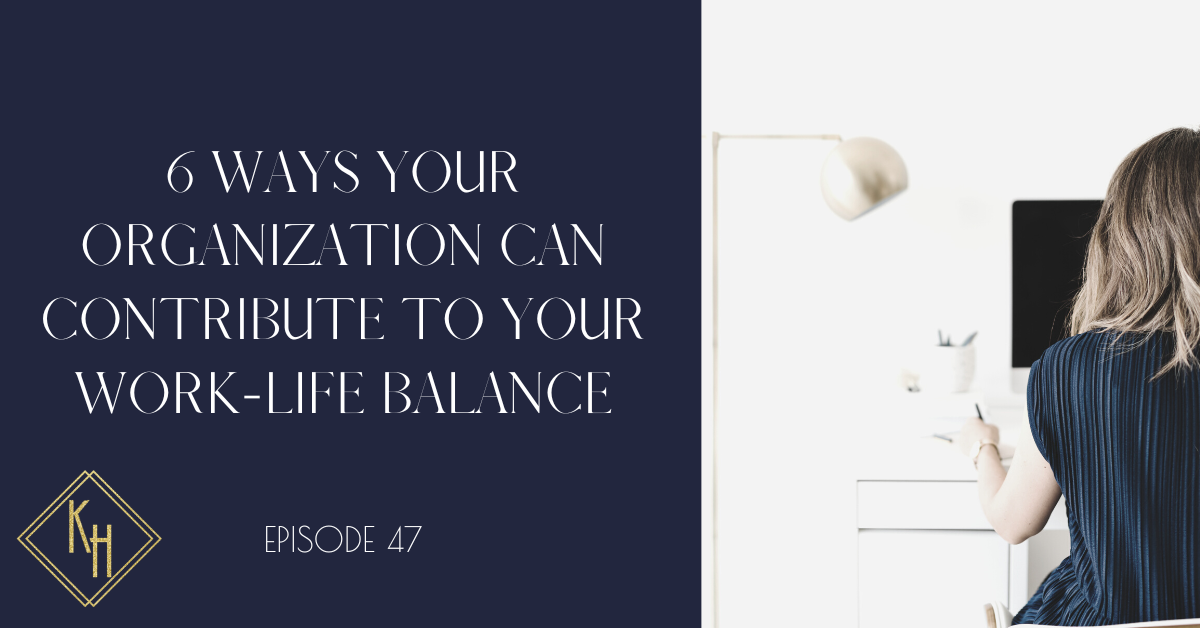6 Ways Your Organization Contributes to Your Work-Life Balance
Prefer to listen?
Today’s episode has nothing to do with my summer shenanigans but is a little bit different than my usual episodes here on the Elegant Balance podcast. You see, I prefer to discuss strategies that you can use to enhance your work-life balance. And by that, I mean that I like to focus on the things that you have control over – identifying your values, saying no to things that don’t move you towards your goals, time management, self-care, etc. However, there are other actors at play when it comes to your work-life balance. Namely, your organization, the people you work with, you family, and your friends. So today I want to discuss different ways that your organization can contribute to your work-life balance. As your will soon see, many of them are related to employee benefits and I want to encourage you to go back and check your employee handbook or go talk to HR because it’s quite possible that you aren’t aware of all the benefits available to you and if they can help you create the life you want, then there’s no reason to leave them sitting on the table!
Okay, let’s dive in…
Want to create your own strategic life plan?
I’ve created this life planner just for you! Inside, I walk you step-by-step through creating your life plan.
You can get it by clicking the button below!
6 Ways Your Organization Can Contribute to Your Work-Life Balance:
1. Flexible Work Arrangements
Flexible work arrangements are “work options that permit flexibility in terms of “where” work is completed (often referred to as telecommuting or flexplace) and/or “when” work is completed (often referred to as flextime or scheduling flexibility).” Flexible work arrangements have become increasingly popular after the pandemic, as many of us found ourselves working from home for a significant period of time. Flexible work arrangements are helpful in creating work-life balance because when we have control over when and where we work, we are able to reduce the extent to which our work and family responsibilities conflict with one another. They can also increase the extent to which we can fully engage in our work and non-work roles.
2. Dependent Care Support
A key driver behind work-life balance is whether or not we are able to successfully perform our roles as employees and caregivers. Often, we are torn between working and caring for our children or aging parents, which leaves us feeling anything but balanced. To address this, some organizations offer dependent care support such as an on-site childcare center, subsidized local childcare, childcare information or referral services, paid parental leave, adoption subsidies, and elder care resources.
3. Health & Wellness Programs
When it comes to all the roles you play – employee, mother, wife, friend, etc. – you are the common denominator. And in order to successfully perform each role (a key part of work-life balance), you need to be healthy enough to do so. This is why health and wellness programs can be so beneficial in supporting your work-life balance. Health and wellness programs will vary from organization to organization, but they typically include perks such as on-site fitness facilities, healthy food options, or access to mental health professionals. In other words, they are designed to help you be the best version of yourself, mentally and physically, so that you can show up in each of your roles.
4. Vacation Time
Paid vacation days are another way that your organization can contribute to your work-life balance. Typically, paid vacation is offered as a benefit after having worked at an organization for a specified period of time. In 2021, more than 33% of private industry workers received 10-14 days of paid vacation after their first year of service. I’ve done an entire episode on the importance of taking vacation, so be sure to check it out. I’ll link it in the show notes. The main takeaway is that taking vacation gives us a chance to take a step back and vacations are linked to short-term increases in life satisfaction and decreases in exhaustion and physical health complaints. Other benefits of taking vacation include increased resilience, better perspective on work and life, and increased creativity in how you approach work problems.
5. Breaks
In order to meet the demands of work and home, you need resources. Taking breaks at work is one way to replenish your energy and ensure that you are able to stay engaged and focused throughout the workday. Breaks give you a chance to step away from work and refresh and most organizations offer some type of break to their employees. Yet, many of us don’t take the breaks we’re given. And even if we do take those breaks, we may not make the most of them. Research suggests that the best breaks (i.e., the most replenishing ones) are breaks that are spent doing something that you enjoy and that occur earlier in the shift.
6. Supervisor Support
Finally, your supervisor plays an important role in your work-life balance. Having a supervisor who supports you in your efforts to manage your work and family responsibilities goes a long way. Research has linked family-supportive supervisor behaviors to increased use of family-friendly benefits, job satisfaction, and job commitment. Family supportive supervisor behaviors has also been linked to employee physical and psychological health. And if we’re utilizing family-friendly benefits, happy at work, and physically and mentally healthy, we’re inevitably going to feel more balanced!
So, there you have it. Six ways that your organization could contribute to your work-life balance.
Like I said before, I know you don’t necessarily have control over these things but hopefully it is helpful to know which types of benefits and support are out there and how they might be beneficial to your overall work-life balance. My guess is that you will walk away from today’s episode in 1 of 3 ways:
1. Realizing that your organization is doing a great job of supporting your work-life balance and feeling grateful for that. I hope the vast majority of you are here!
2. Seeing that there are ways that your organization could better support you. If this is you, I encourage you to go after that support. Maybe you utilize some work-family benefits that you hadn’t previously considered. Or maybe you negotiate for some of those benefits to be given to you.
3. Understanding that maybe the reason you feel so completely out of balance is not because you haven’t found the perfect planner or morning routine, but because your organization is doing nothing to support your work-life balance. In this case, it may be time to reassess whether your organization is a good fit for you.
Is a better work-life balance one of your goals this year?
I’ve created a workbook just for you!








Sharing this with you makes me smile – I love thinking back to the girl who felt confident and beautiful in that rainbow shirt and the girl who refused to attend her college classes in baggy t-shirts and Ugg boots and instead opted for a sequined top. Because despite what I think about those choices now, in each of those seasons I was intentionally using personal style to my advantage.